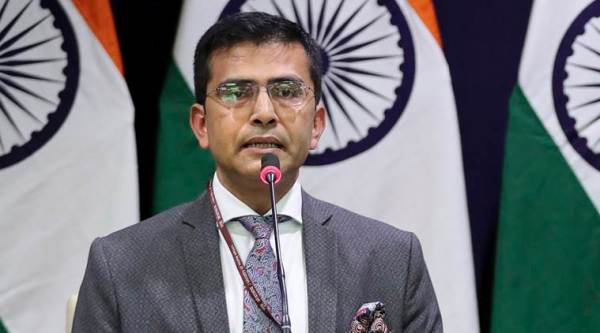
In its first clear and official assessment of Pakistan’s actions over UN-proscribed terrorist groups Jaish-e-Mohammed (JeM) and Jamaat-ud-Dawa (JuD), India on Saturday made it clear that Pakistan will be judged not by words but on basis of action it takes to dismantle terror infrastructure on its soil.
Slamming Pakistan for remaining in a state of denial, Ministry of External Affairs’ official spokesperson Raveesh Kumar said, “It is regrettable that Pakistan still continues to deny Jaish-e-Mohammed’s own claim of taking ownership of the Pulwama attack.”
Kumar referred to Pakistan Foreign Minister Shah Mahmood Qureshi’s recent interview to BBC, in which he spoke about “some confusion” about JeM’s claim on Pulwama attack. “Is Pakistan defending Jaish-e-Mohammed and acting as its spokesperson? Does Pakistan’s claim have any credibility,” he asked.
He said despite Qureshi and Pakistan’s former President Pervez Musharraf acknowledging JeM’s presence in Pakistan, the Pakistan armed forces spokesperson openly denied its presence in the country.
“If Pakistan claims to be a naya Pakistan with nayi soch’, it should show ‘naya action’ against terrorist groups and terror infrastructure on its soil and end cross-border terrorism in support of its claims,” Kumar said.
Kumar also said India’s non-military strike on JeM terror training camp in Balakot achieved its desired objective. “So the initial bravado — that everything is open, please come and visit — has disappeared. We are absolutely confident that strikes on Balakot has been successful and achieved the desired objectives,” he said. New Delhi’s comments come a day after Pakistan Prime Minister Imran Khan said that he will not allow Pakistani soil to be used for terror directed at other countries. Khan has been saying that a ‘naya Pakistan’ is embarking on a new journey under his leadership.
Kumar said Pakistan has been making identical statements after separate terror attacks and now Islamabad will have to take up concrete action the international community expected it to take and must rein in terror groups operating from its soil. “We remain resolute in our determination to persuade the international community of the necessity of compelling Pakistan to move beyond mere words and to show credible, verifiable and sustained actions. We have, and we will continue to act with responsibility and maturity,” he said.
Kumar said the widespread presence of terrorist camps in Pakistan is public knowledge, and repeated requests by India and the international community for the country to act against such groups have been met with “denial”. He said, “In 2004, the then President of Pakistan had made a solemn public commitment that they would not allow any territory under their control to be used for terrorist activity in any manner. But till today, Pakistan has failed to take any credible action against Jaish-e-Mohammed and other terrorist organisations, which continue to operate with impunity from Pakistan.”
On Pakistan’s retaliatory strike, after IAF’s February 26 strike in Balakot, Kumar said instead of taking action against terrorist groups on its soil, Islamabad chose to escalate through an “act of aggression” by violating Indian airspace and attempting, unsuccessfully, to target military facilities. He also accused Pakistan of propagating a “false narrative” of the events of the day when Pakistani jets unsuccessfully attempted to target Indian military installations.
He said Pakistan will be judged not by its words but on the basis of action it takes to dismantle terror infrastructure.